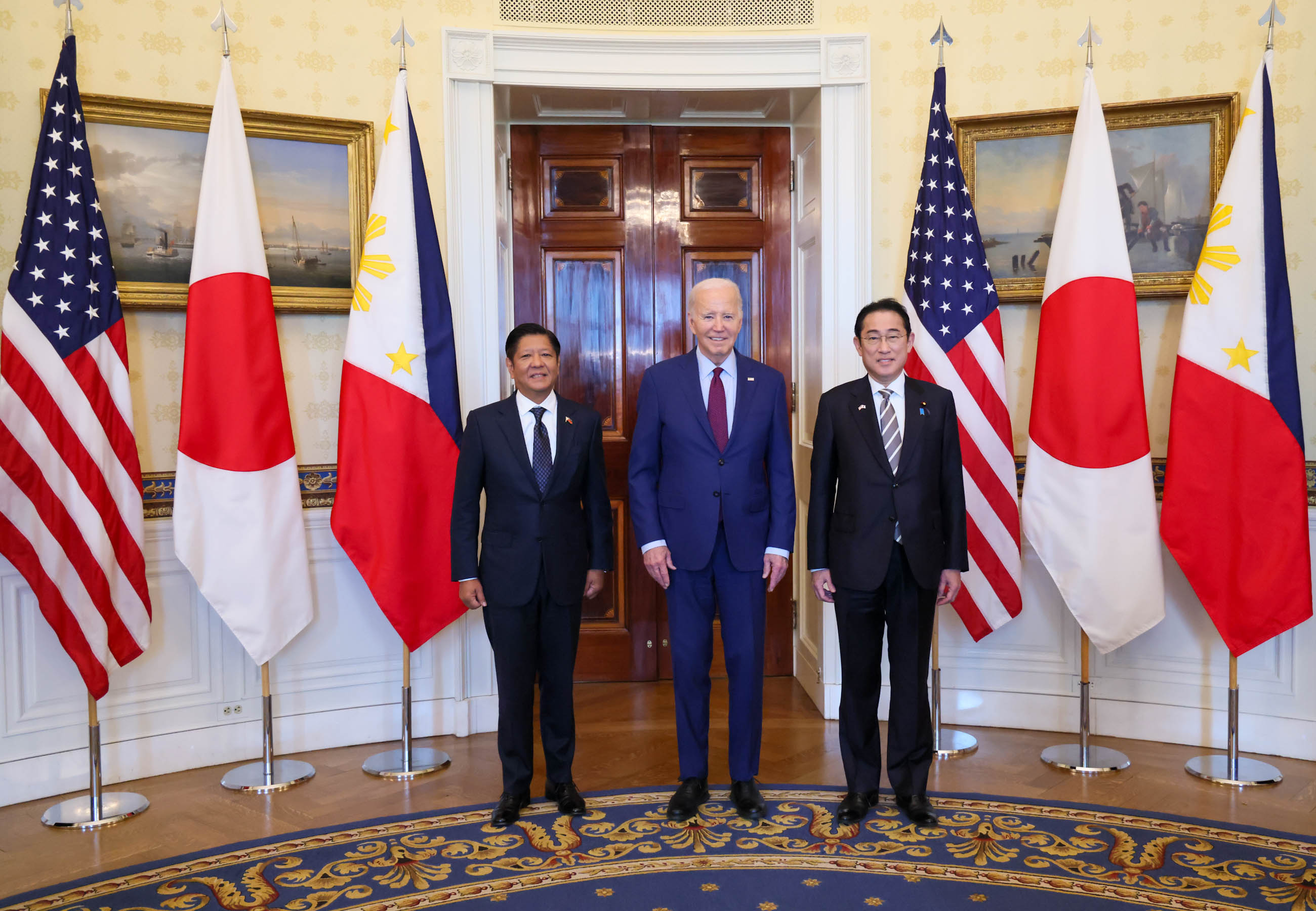Japan-U.S.-Philippines Summit Meeting (Summary)
April 11, 2024
[Provisional translation]
On April 11, commencing at 4:20 p.m. for approximately 50 minutes, Mr. KISHIDA Fumio, Prime Minister of Japan, who is visiting Washington, D.C., the United States, held a Japan-U.S.-Philippines Summit with the Honorable Joseph R. Biden, Jr., President of the United States of America and H.E. Ferdinand R. Marcos, Jr., President of the Republic of the Philippines. The overview of the meeting is as follows.
The “Joint Vision Statement from the Leaders of Japan, the Philippines, and the United States" was issued after the meeting.
1. Introduction
President Biden welcomed the visit of Prime Minister Kishida and President Marcos to the U.S. and the first Japan-U.S.-Philippines Summit, and stated that he would like to further advance Japan-U.S.-Philippines cooperation in various areas of security and economy based on this Summit.
In response, Prime Minister Kishida welcomed the first trilateral Summit, and stated that he attached importance to multilayered collaboration among allies and like-minded countries in order to maintain and strengthen the free and open international order based on the rule of law, amidst the multiple crises the international community is facing. In addition, Prime Minister Kishida stated that Japan, the United States and the Philippines were natural partners and maritime nations linked together by the Pacific Ocean, and that for peace and prosperity in the Indo-Pacific region, he would like to see this Summit affirm the further strengthening of trilateral cooperation and show a concrete way forward.
President Marcos expressed gratitude to President Biden for his initiative and for the support provided by Japan and the U.S., and expressed his wish to further strengthen Japan-U.S.-Philippines cooperation.
2. Regional Situation
(1) The three leaders confirmed that the Japan-U.S. Alliance and the U.S.-Philippines Alliance have protected peace and security in the Indo-Pacific, and discussed the security environment in the region. President Biden affirmed his commitment based on the Japan-U.S. Alliance and the U.S-Philippines Alliance.
(2) The three leaders underscored their unwavering commitment to freedom of navigation and overflight.
(3) The three leaders confirmed that the three countries would oppose and resolutely respond to any attempts by People’s Republic of China (PRC) to unilaterally change the status quo by force in the South China Sea and the East China Sea.
(4) In discussing these regional developments, Prime Minister Kishida explained that Japan and the Philippines have made progress in bilateral cooperation, including in negotiations toward an early conclusion of the Reciprocal Access Agreement (RAA), the provision of coastal surveillance radars to the Philippines under the Official Security Assistance (OSA), and the provision of additional patrol vessels through ODA, and that Japan had recently revised the Three Principles on the Transfer of Defense Equipment and Technology and its Implementation Guidelines. President Biden and President Marcos expressed appreciation and welcome for such efforts made by Japan.
3. Trilateral Cooperation
(1) Prime Minister Kishida stated that Japan-U.S.-Philippines cooperation was inclusive and would bring peace, stability, and economic prosperity to the region, including the Philippines, and then the three leaders discussed a concrete way forward on trilateral cooperation mainly in the economic field.
(2) The three leaders expressed concern over and strongly opposed economic coercion and underscored the need for close coordination in dealing with economic coercion.
(3) The three leaders confirmed the importance of promoting the development of strategically critical infrastructure and welcomed the launch of “the Partnership for Global Infrastructure and Investment (PGII) Luzon Economic Corridor”.
(4) The three leaders confirmed their intention to strengthen cooperation towards enhancing the resilience of supply chains for critical materials such as semiconductors and critical minerals.
(5) The three leaders confirmed to strengthen cooperation in the field of information and communication technology including Open RAN.
(6) The three leaders confirmed to strengthen cooperation in the field of cyber such as the establishment of the Japan-U.S.-Philippines Cyber and Digital Dialogue.
(7) The three leaders confirmed that decarbonization was a common challenge in Asia, and that the three countries would strengthen cooperation in the field of clean energy including civil nuclear energy.
(8) The three leaders concurred to continue strengthening security and defense cooperation including through dialogues among defense authorities and joint exercises, as well as maritime safety cooperation including through coordination and cooperation among coastal guards.
